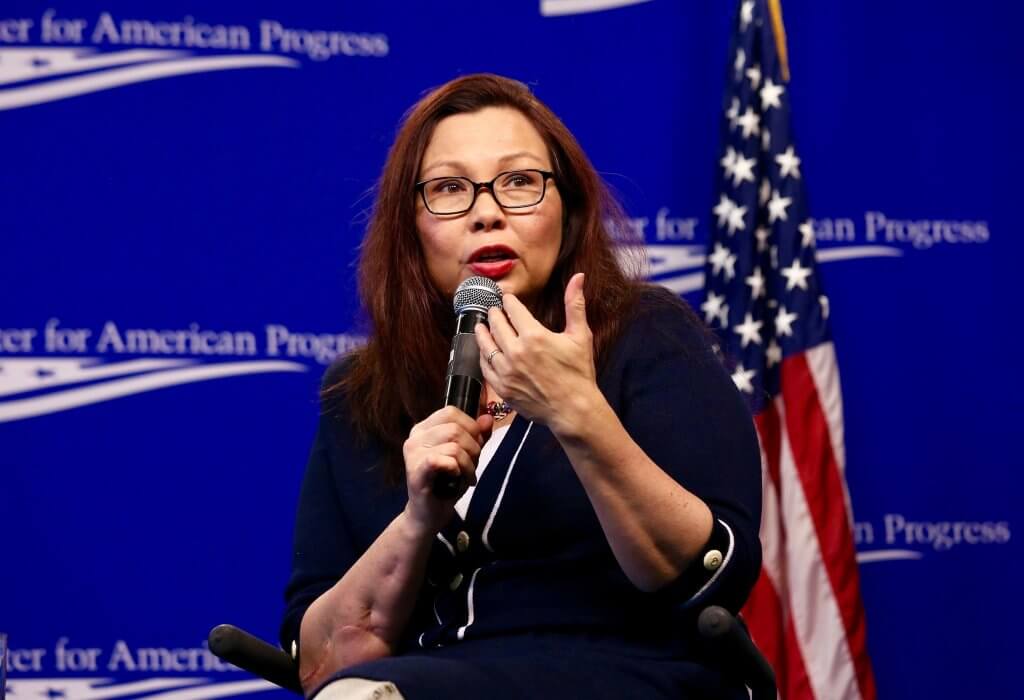When you walk into the office of Sen. Tammy Duckworth, on display are symbols of the many roles she represents. To the right, the Soldier’s Creed hangs above her desk just as it hung above her bed when she was recovering at Walter Reed. To the left side of the room sits a bassinet adorned with white and pink plush for the newest member of her family, baby Maile.
The senator always knew she would serve her country in some way, but she thought it would be in a different capacity. She says her decision to go the military route came during graduate school.
“People assume it (decision to serve) was because I come from a military family, but it really actually isn’t. I was in graduate school at George Washington University—I thought I was going to go into the Foreign Service,” she said. “I grew up in Southeast Asia, post-Vietnam. I just remembered how well-respected the United States was and how people just wanted to be like us and revered who we were, and how lucky I was to be an American.”
A friend encouraged her to join the ROTC program. It was then that she fell in love with the camaraderie and leadership expectations of the Army, she says.
“It was that profound for me. … It was the first time in my life that I was part of something that was something bigger than me,” Duckworth explained.
Duckworth served 23 years in the Reserve Forces, retiring in 2014. A pivotal moment in her career came during a 2004 deployment to Iraq when the Blackhawk she was piloting for the Illinois Army National Guard was struck by a RPG and crashed. She lost her legs and partial use of her right arm.
The highest ranking amputee
She spent a year recovering at Walter Reed National Military Medical Center (formerly Walter Reed Army Medical Center). It was during that recovery that Sen. Duckworth found herself in an advocacy role for fellow veterans and wounded warriors—including testifying before Congress. It was also during this time that she would meet a mentor who later put her on the path to politics.
“I had never wanted to run for office. It really started with me trying to be a good officer and taking care of my soldiers, literally. When I was recovering at Walter Reed, I happened to be the highest ranking amputee. Found out three days before I was shot down that I would be pinning on my oak leaf. I ended up getting promoted at the hospital,” Duckworth said. “At the time, there were a lot of problems with Walter Reed, not in terms of the medical care but in terms of the administrative support.”
She watched upclose as soldiers and their families were being put through unnecessary stressors. She joined with fellow officers and NCOs in taking on the bureaucracy issues and later met Sen. Dick Durbin and a young Sen. Barack Obama.
“Sen. Durbin had given me his personal business card with his phone number on it, and said if you have any problems with Walter Reed—you’re from Illinois—call me,” she said.
So, she did what any determined officer would do for her soldiers — she called. That year, Durbin became the ‘unofficial Ombudsman for Walter Reed’.
He also invited her to be his official guest for President Bush’s State of the Union address. Duckworth explains why she was compelled to attend.
“I went because I wanted to see our democracy up close and see the institution that I had given up my legs protecting.”
Priorities
Sens. Durbin and Obama mentored her on where to get her start in politics. She found one of the key benefits of having combat experienced veterans in elected office is the perspective they can offer on how decisions in Washington D.C. affect the total military. Sen. Duckworth’s unique positioning put the following at the center of her priority list:
- Health and well-being of veterans and military members
- Oversight with waste and fraud in the military
- Lead and educate colleagues on impact of national policy on military
“I go from very granular—protecting service members from payday lenders—all the way through to challenging both President Obama and President Trump on what are we doing with North Korea,” she said.
Her message to fellow veterans
And she hopes to see more veterans step into governmental roles on every level.
“Do it,” she said. “My advice to them (veterans) is call me, whether you run as a Democrat or even if you want to run as a Republican, I will put you in touch with the right Republicans. I think we need more members of the military in the halls of government.
Too many decisions are being made on war and peace and on the lives of our military men and women, and on the lives of veterans, by people who have no experience in the military. I am dedicated to making sure that anyone that wants to run that I will speak with them,” she added.
Fast facts with Sen. Duckworth
What are you currently reading?
I’m currently reading two books: A Nantucket Wedding and Superforecasting: The Art and Science of Prediction
What’s your favorite thing to do in DC?
My favorite thing to do whenever I have free time is to spend it with my family and my beautiful baby daughters.
What did you want to be when you were growing up?
I always wanted to work in a U.S. Embassy – my dream job to this day is still to be a U.S. ambassador somewhere. It really goes back to when I was a kid growing up in Southeast Asia and I saw for myself what America meant to the world and how much our country’s values meant to people.
Connect with Sen. Duckworth on Twitter.

